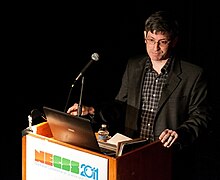
Carl Edward Sagan was an American astronomer and science communicator. His best known scientific contribution is his research on the possibility of extraterrestrial life, including experimental demonstration of the production of amino acids from basic chemicals by radiation. He assembled the first physical messages sent into space, the Pioneer plaque and the Voyager Golden Record, which were universal messages that could potentially be understood by any extraterrestrial intelligence that might find them. He argued in favor of the hypothesis, which has since been accepted, that the high surface temperatures of Venus are the result of the greenhouse effect.

Edward Osborne WilsonForMemRS was an American biologist, naturalist, ecologist, and entomologist known for developing the field of sociobiology.

Thomas Hunt Morgan was an American evolutionary biologist, geneticist, embryologist, and science author who won the Nobel Prize in Physiology or Medicine in 1933 for discoveries elucidating the role that the chromosome plays in heredity.
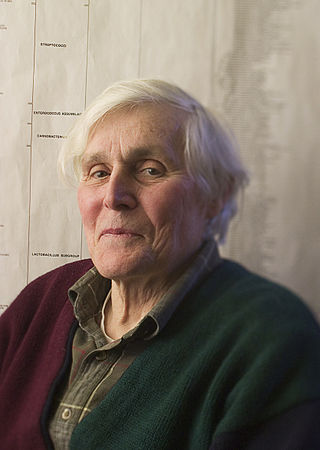
Carl Richard Woese was an American microbiologist and biophysicist. Woese is famous for defining the Archaea in 1977 through a pioneering phylogenetic taxonomy of 16S ribosomal RNA, a technique that has revolutionized microbiology. He also originated the RNA world hypothesis in 1967, although not by that name. Woese held the Stanley O. Ikenberry Chair and was professor of microbiology at the University of Illinois Urbana–Champaign.

Hans Florian Zimmer is a German film score composer and music producer. He has won two Oscars and four Grammys, and has been nominated for three Emmys and a Tony. Zimmer was also named on the list of Top 100 Living Geniuses, published by The Daily Telegraph in 2007.

Max Ludwig Henning Delbrück was a German–American biophysicist who participated in launching the molecular biology research program in the late 1930s. He stimulated physical scientists' interest into biology, especially as to basic research to physically explain genes, mysterious at the time. Formed in 1945 and led by Delbrück along with Salvador Luria and Alfred Hershey, the Phage Group made substantial headway unraveling important aspects of genetics. The three shared the 1969 Nobel Prize in Physiology or Medicine "for their discoveries concerning the replication mechanism and the genetic structure of viruses". He was the first physicist to predict what is now called Delbrück scattering.

Franciscus Bernardus Maria "Frans" de Waal is a Dutch primatologist and ethologist. He is the Charles Howard Candler Professor of Primate Behavior in the Department of Psychology at Emory University in Atlanta, Georgia, director of the Living Links Center at the Yerkes National Primate Research Center at Emory, and author of numerous books including Chimpanzee Politics (1982) and Our Inner Ape (2005). His research centers on primate social behavior, including conflict resolution, cooperation, inequity aversion, and food-sharing. He is a member of the United States National Academy of Sciences and the Royal Netherlands Academy of Arts and Sciences.

Luc Montagnier was a French virologist and joint recipient, with Françoise Barré-Sinoussi and Harald zur Hausen, of the 2008 Nobel Prize in Physiology or Medicine for his discovery of the human immunodeficiency virus (HIV). He worked as a researcher at the Pasteur Institute in Paris and as a full-time professor at Shanghai Jiao Tong University in China.

Arthur Kornberg was an American biochemist who won the Nobel Prize in Physiology or Medicine 1959 for the discovery of "the mechanisms in the biological synthesis of ribonucleic acid and deoxyribonucleic acid" together with Spanish biochemist and physician Severo Ochoa of New York University. He was also awarded the Paul-Lewis Award in Enzyme Chemistry from the American Chemical Society in 1951, an L.H.D. degree from Yeshiva University in 1962, and the National Medal of Science in 1979. In 1991, Kornberg received the Golden Plate Award of the American Academy of Achievement and the Gairdner Foundation Award in 1995.
Alfred Henry Sturtevant was an American geneticist. Sturtevant constructed the first genetic map of a chromosome in 1911. Throughout his career he worked on the organism Drosophila melanogaster with Thomas Hunt Morgan. By watching the development of flies in which the earliest cell division produced two different genomes, he measured the embryonic distance between organs in a unit which is called the sturt in his honor. On February 13, 1968, Sturtevant received the 1967 National Medal of Science from President Lyndon B. Johnson.
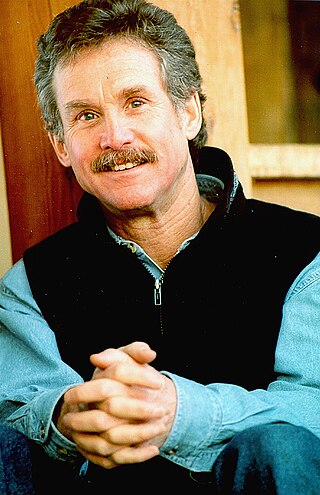
David Quammen is an American science, nature, and travel writer and the author of fifteen books. His articles have appeared in Outside Magazine, National Geographic, Harper's, Rolling Stone, The New York Times Book Review, The New Yorker, and other periodicals.
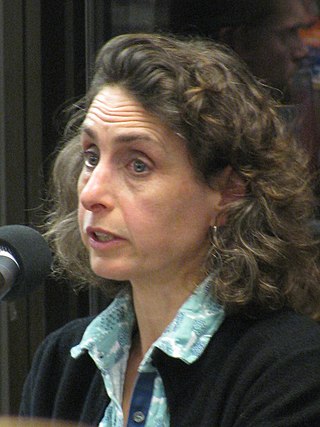
Elizabeth Kolbert is an American journalist, author, and visiting fellow at Williams College.
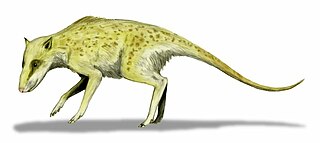
Indohyus is an extinct genus of digitigrade even-toed ungulates known from Eocene fossils in Asia. This small chevrotain-like animal found in the Himalayas is one of the earliest known non-cetacean ancestors of whales.

Arthur L. Horwich is an American biologist and Sterling Professor of Genetics and Pediatrics at the Yale School of Medicine. Horwich has also been a Howard Hughes Medical Institute investigator since 1990. His research into protein folding uncovered the action of chaperonins, protein complexes that assist the folding of other proteins; Horwich first published this work in 1989.

Benjamin Zimmer is an American linguist, lexicographer, and language commentator. He is a language columnist for The Wall Street Journal and contributing editor for The Atlantic. He was formerly a language columnist for The Boston Globe and The New York Times Magazine, and editor of American dictionaries at Oxford University Press. Zimmer was also an executive editor of Vocabulary.com and VisualThesaurus.com.

Francis Sellers Collins is an American physician-geneticist who discovered the genes associated with a number of diseases and led the Human Genome Project. He served as director of the National Institutes of Health (NIH) in Bethesda, Maryland, from 17 August 2009 to 19 December 2021, serving under three presidents.
Joseph (Joe) Thornton is an American Biologist. He is a professor at the University of Chicago and a former Early Career Scientist of the Howard Hughes Medical Institute. He is known for resurrecting ancestral genes and tracing the mechanisms by which proteins evolve new functions.
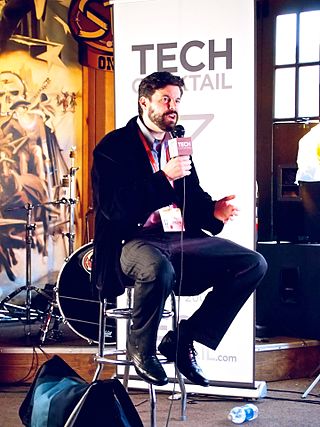
Charles Duhigg is an American journalist and non-fiction author. He was a reporter for The New York Times, currently writes for The New Yorker Magazine and is the author of two books on habits and productivity, titled The Power of Habit: Why We Do What We Do in Life and Business and Smarter Faster Better. In 2013, Duhigg was the recipient of the Pulitzer Prize for Explanatory Reporting for a series of 10 articles on the business practices of Apple and other technology companies.

Jennifer Anne Doudna is an American biochemist who has done pioneering work in CRISPR gene editing, and made other fundamental contributions in biochemistry and genetics. Doudna was one of the first women to share a Nobel in the sciences. She received the 2020 Nobel Prize in Chemistry, with Emmanuelle Charpentier, "for the development of a method for genome editing." She is the Li Ka Shing Chancellor's Chair Professor in the department of chemistry and the department of molecular and cell biology at the University of California, Berkeley. She has been an investigator with the Howard Hughes Medical Institute since 1997.
Paul E. Turner is an American evolutionary biologist and virologist, the Rachel Carson Professor of ecology and evolutionary biology at Yale University, and a faculty member in microbiology at the Yale School of Medicine. His research focuses on the evolutionary genetics of viruses, particularly bacteriophages and RNA viruses transmitted by mosquitoes.
